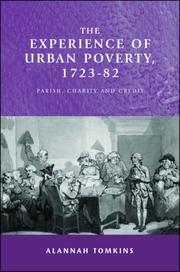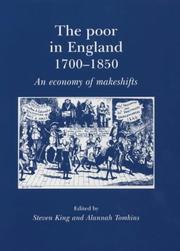| Listing 1 - 7 of 7 |
Sort by
|

ISBN: 0719075041 9780719075049 Year: 2006 Publisher: Manchester Manchester University Press
Abstract | Keywords | Export | Availability | Bookmark
 Loading...
Loading...Choose an application
- Reference Manager
- EndNote
- RefWorks (Direct export to RefWorks)
History of the United Kingdom and Ireland --- anno 1700-1799
Book
ISBN: 9781526116079 1526116073 9781526116086 1526116081 9781526116109 1526116103 1526116103 Year: 2017 Publisher: Manchester
Abstract | Keywords | Export | Availability | Bookmark
 Loading...
Loading...Choose an application
- Reference Manager
- EndNote
- RefWorks (Direct export to RefWorks)
This book looks at medical professionalisation from a new perspective, one of failure rather than success. It questions the existing picture of broad and rising medical prosperity across the nineteenth century to consider the men who did not keep up with professionalising trends. It unpicks the life stories of men who could not make ends meet or who could not sustain a professional persona of disinterested expertise, either because they could not overcome public accusations of misconduct or because they struggled privately with stress. In doing so it uncovers the trials of the medical marketplace and the pressures of medical masculinity. All professionalising groups risked falling short of rising expectations, but for doctors these expectations were inflected in some occupationally specific ways.
Physicians. --- Medicine --- Clinical sciences --- Medical profession --- Human biology --- Life sciences --- Medical sciences --- Pathology --- Physicians --- Allopathic doctors --- Doctors --- Doctors of medicine --- MDs (Physicians) --- Medical doctors --- Medical personnel --- History --- Health Workforce --- Medicine - England - History - 18th century --- Medicine - Wales - History - 18th century --- Medicine - England - History - 19th century --- Medicine - Wales - History - 19th century

ISBN: 0719061598 0719080436 9786610734139 1847790666 1280734132 1423706382 9781423706380 9781847790668 9780719061592 9781280734137 9781526137869 1526137860 Year: 2003 Publisher: Manchester, U.K. ; New York : Manchester University Press,
Abstract | Keywords | Export | Availability | Bookmark
 Loading...
Loading...Choose an application
- Reference Manager
- EndNote
- RefWorks (Direct export to RefWorks)
This fascinating study investigates the experience of English poverty between 1700 and 1900 and in the ways in which the poor made ends meet. The phrase 'economy of makeshifts' has often been used to summarise the patchy, desperate and sometimes failing
History of the United Kingdom and Ireland --- anno 1700-1799 --- anno 1800-1899 --- Charity --- Income --- Poor --- Public welfare --- Social networks --- History. --- Networking, Social --- Networks, Social --- Social networking --- Social support systems --- Support systems, Social --- Interpersonal relations --- Cliques (Sociology) --- Microblogs --- Benevolent institutions --- Poor relief --- Public assistance --- Public charities --- Public relief --- Public welfare reform --- Relief (Aid) --- Social welfare --- Welfare (Public assistance) --- Welfare reform --- Human services --- Social service --- Disadvantaged, Economically --- Economically disadvantaged --- Impoverished people --- Low-income people --- Pauperism --- Poor, The --- Poor people --- Persons --- Social classes --- Poverty --- Family income --- Fortunes --- Household income --- Personal income --- Economics --- Finance --- Property --- Wealth --- Gross national product --- Profit --- Purchasing power --- Alms and almsgiving --- Conduct of life --- Government policy --- Economic conditions

ISBN: 0719061598 Year: 2003 Publisher: Manchester Manchester University Press
Abstract | Keywords | Export | Availability | Bookmark
 Loading...
Loading...Choose an application
- Reference Manager
- EndNote
- RefWorks (Direct export to RefWorks)
History of the United Kingdom and Ireland --- anno 1700-1799 --- anno 1800-1899
Book
Abstract | Keywords | Export | Availability | Bookmark
 Loading...
Loading...Choose an application
- Reference Manager
- EndNote
- RefWorks (Direct export to RefWorks)
This fascinating study investigates the experience of English poverty between 1700 and 1900 and in the ways in which the poor made ends meet. The phrase 'economy of makeshifts' has often been used to summarise the patchy, desperate and sometimes failing strategies of the poor for material survival. Incomes or benefits derived from such strategies allegedly ranged from wages supported by under-employment via petty crime through to charity, but allusions to this array of makeshifts usually fall short of answering vital questions about how and when the poor secured access to them. This book represents the single most significant attempt in print to supply the English 'economy of makeshifts' with a solid, empirical basis and to advance the concept of makeshifts from a vague but convenient label to a more precise yet inclusive definition. Individual chapters written by some of the leading, young historians of welfare examine how advantages gained from access to common land, mobilisation of kinship support, resorting to crime, and other marginal resources could prop up struggling households. They suggest how the balance of these strategies might change over time or be modified by gender, life-cycle and geography. A comprehensive introduction summarises the state of research on English poverty, and a thought-provoking conclusion makes valuable suggestions for the direction of future research. This book will be crucial for historians of social life and welfare, of interest to researchers working on eighteenth- /nineteenth- century England and will be useful to undergraduates seeking guidance on the historiography of poverty.
Poor --- Charity --- Income --- Public welfare --- Social networks --- History --- History. --- history --- poor --- poverty --- england --- Kinship --- Lancashire --- London --- Pawnbroker --- Poor relief --- Vestry
Book
Abstract | Keywords | Export | Availability | Bookmark
 Loading...
Loading...Choose an application
- Reference Manager
- EndNote
- RefWorks (Direct export to RefWorks)
This fascinating study investigates the experience of English poverty between 1700 and 1900 and in the ways in which the poor made ends meet. The phrase 'economy of makeshifts' has often been used to summarise the patchy, desperate and sometimes failing strategies of the poor for material survival. Incomes or benefits derived from such strategies allegedly ranged from wages supported by under-employment via petty crime through to charity, but allusions to this array of makeshifts usually fall short of answering vital questions about how and when the poor secured access to them. This book represents the single most significant attempt in print to supply the English 'economy of makeshifts' with a solid, empirical basis and to advance the concept of makeshifts from a vague but convenient label to a more precise yet inclusive definition. Individual chapters written by some of the leading, young historians of welfare examine how advantages gained from access to common land, mobilisation of kinship support, resorting to crime, and other marginal resources could prop up struggling households. They suggest how the balance of these strategies might change over time or be modified by gender, life-cycle and geography. A comprehensive introduction summarises the state of research on English poverty, and a thought-provoking conclusion makes valuable suggestions for the direction of future research. This book will be crucial for historians of social life and welfare, of interest to researchers working on eighteenth- /nineteenth- century England and will be useful to undergraduates seeking guidance on the historiography of poverty.
Poor --- Poor --- Charity --- Income --- Public welfare --- Social networks --- History --- History --- History. --- History. --- History. --- History. --- history --- poor --- poverty --- england --- Kinship --- Lancashire --- London --- Pawnbroker --- Poor relief --- Vestry
Book
Abstract | Keywords | Export | Availability | Bookmark
 Loading...
Loading...Choose an application
- Reference Manager
- EndNote
- RefWorks (Direct export to RefWorks)
This fascinating study investigates the experience of English poverty between 1700 and 1900 and in the ways in which the poor made ends meet. The phrase 'economy of makeshifts' has often been used to summarise the patchy, desperate and sometimes failing strategies of the poor for material survival. Incomes or benefits derived from such strategies allegedly ranged from wages supported by under-employment via petty crime through to charity, but allusions to this array of makeshifts usually fall short of answering vital questions about how and when the poor secured access to them. This book represents the single most significant attempt in print to supply the English 'economy of makeshifts' with a solid, empirical basis and to advance the concept of makeshifts from a vague but convenient label to a more precise yet inclusive definition. Individual chapters written by some of the leading, young historians of welfare examine how advantages gained from access to common land, mobilisation of kinship support, resorting to crime, and other marginal resources could prop up struggling households. They suggest how the balance of these strategies might change over time or be modified by gender, life-cycle and geography. A comprehensive introduction summarises the state of research on English poverty, and a thought-provoking conclusion makes valuable suggestions for the direction of future research. This book will be crucial for historians of social life and welfare, of interest to researchers working on eighteenth- /nineteenth- century England and will be useful to undergraduates seeking guidance on the historiography of poverty.
Poor --- Poor --- Charity --- Income --- Public welfare --- Social networks --- history --- poor --- poverty --- england --- Kinship --- Lancashire --- London --- Pawnbroker --- Poor relief --- Vestry --- History --- History --- History. --- History. --- History. --- History. --- history --- poor --- poverty --- england --- Kinship --- Lancashire --- London --- Pawnbroker --- Poor relief --- Vestry
| Listing 1 - 7 of 7 |
Sort by
|

 Search
Search Feedback
Feedback About UniCat
About UniCat  Help
Help News
News